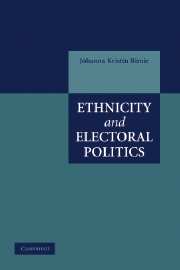Book contents
- Frontmatter
- Contents
- List of Tables and Figures
- Acknowledgments
- 1 Introduction: The Ethnic Effect
- 2 Ethnic Attractors
- 3 Ethnic Attractors and Exogenous Constraints
- 4 Ethnic Voting in Romania
- 5 Ethnic Voting and Party System Stability
- 6 Ethnic Politics and Access
- 7 The Ethnic Effect on Regime Stability
- 8 Conclusions
- Appendix A The Model (Formal Version)
- Appendix B Measurements and Other Methods Issues
- References
- Index
2 - Ethnic Attractors
Published online by Cambridge University Press: 03 December 2009
- Frontmatter
- Contents
- List of Tables and Figures
- Acknowledgments
- 1 Introduction: The Ethnic Effect
- 2 Ethnic Attractors
- 3 Ethnic Attractors and Exogenous Constraints
- 4 Ethnic Voting in Romania
- 5 Ethnic Voting and Party System Stability
- 6 Ethnic Politics and Access
- 7 The Ethnic Effect on Regime Stability
- 8 Conclusions
- Appendix A The Model (Formal Version)
- Appendix B Measurements and Other Methods Issues
- References
- Index
Summary
In the 2000 parliamentary election Romanian voters decimated the umbrella party that had governed the country since 1996. Many Romanian scholars considered the result a protest vote against a party bloc that had failed to carry out the reforms deemed necessary to get the country back on track. In that same election, however, a partner of the coalition in the government, the Hungarian minority party, retained most of its support when returns were compared to those in the 1996 election. According to the currently popular ethnic conflict literature, the loyalties of Hungarian voters are no surprise. This literature generally holds that ethnic violence stems from the type of intransigent loyalty that motivates members of an ethnic group to support the group doggedly hrough trials and tribulations that often are far more devastating than economic decline.
In fact, however, members of ethnic groups frequently withdraw their electoral support from one political party in favor of another. For instance, German, Italian, British, and French ethnic constituencies underwent a significant realignment in the 1940 U.S. presidential election. As a result of its prewar policies, the Roosevelt administration lost much of the German and Italian constituency that had supported it strongly in the presidential election of 1936 to the Republican Party, while gaining considerable support among voters of British and French origin (Key, 1964; Gamm, 1989).
- Type
- Chapter
- Information
- Ethnicity and Electoral Politics , pp. 19 - 40Publisher: Cambridge University PressPrint publication year: 2006



